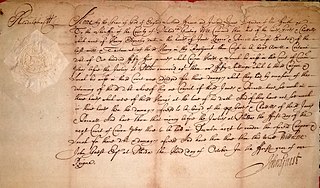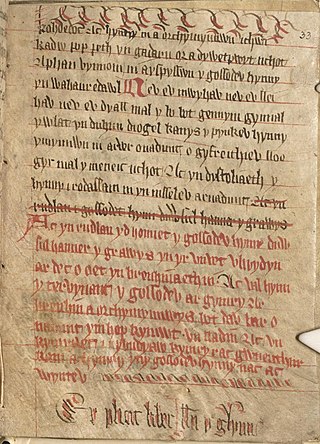Related Research Articles

In common law, a writ is a formal written order issued by a body with administrative or judicial jurisdiction; in modern usage, this body is generally a court. Warrants, prerogative writs, subpoenas, and certiorari are common types of writs, but many forms exist and have existed.
In the English-American common law, quo warranto is a prerogative writ issued by a court which orders someone to show what authority they have for exercising some right, power, or franchise they claim to hold. The writ of quo warranto still exists in the United States, although it is uncommon, but it has been abolished in England and Wales. Quo warranto is also used, with slightly different effect, in the Philippines.

The Statute of Rhuddlan, also known as the Statutes of Wales or as the Statute of Wales, was a royal ordinance by Edward I of England, which gave the constitutional basis for the government of the Principality of Wales from 1284 until 1536.
A writ of coram nobis is a legal order allowing a court to correct its original judgment upon discovery of a fundamental error that did not appear in the records of the original judgment's proceedings and that would have prevented the judgment from being pronounced. The term coram nobis is Latin for "before us" and the meaning of its full form, quae coram nobis resident, is "which [things] remain in our presence". The writ of coram nobis originated in the courts of common law in the English legal system during the sixteenth century.
In English law, a writ of scire facias is a writ founded upon some judicial record directing the sheriff to make the record known to a specified party, and requiring the defendant to show cause why the party bringing the writ should not be able to cite that record in his own interest, or formerly why, in the case of letters patent and grants, the patent or grant should not be annulled and vacated. Largely withdrawn by 1947, its use in the administrative court remains one of the two ways in which a Royal Charter can be involuntarily revoked, the other being primary legislation in Parliament. In the United States, the writ has been abolished under federal law but may still be available in some state legal systems.
A fieri facias, usually abbreviated fi. fa., is a writ of execution after judgment obtained in a legal action for debt or damages for the sheriff to levy on goods of the judgment debtor.
A writ of execution is a court order granted to put in force a judgment of possession obtained by a plaintiff from a court. When issuing a writ of execution, a court typically will order a sheriff or other similar official to take possession of property owned by a judgment debtor. Such property will often then be sold in a sheriff's sale and the proceeds remunerated to the plaintiff in partial or full satisfaction of the judgment. It is generally considered preferable for the sheriff simply to take possession of money from the defendant's bank account. If the judgment debtor owns real property, the judgment creditor can record the execution to "freeze" the title until the execution is satisfied.
A High Court enforcement officer (HCEO) is an officer of the High Court of England and Wales responsible for enforcing judgements of the High Court, often by seizing goods or repossessing property. Prior to 2004, HCEOs were known as sheriff's officers and were responsible for enforcing High Court writs on behalf of the high sheriff for each county, but they are now directly responsible for such writs. HCEOs operate only in England and Wales.
Crown debt, in English law, a debt due to the crown.
A charging order, in English law, is an order obtained from a court or judge by a judgment creditor, by which the property of the judgment debtor in any stocks or funds or shares in a limited liability company or land stands charged with the payment of the amount for which judgment shall have been recovered, with interest and costs.
Judgment summons, in English law, a summons issued under the Debtors' Act 1869 on the application of a creditor who has obtained a judgment for the payment of a sum of money by instalments or otherwise, where the order for payment has not been complied with. The judgment summons cites the defendant to appear personally in court, and be examined on oath as to the means he has, or has had, since the date of the order or judgment made against him, to pay the same, and to show cause why he should not be committed to prison for his default. An order of commitment obtained in a judgment summons remains in force for a year only, and the extreme term of imprisonment is six weeks, dating from the time of lodging in prison.

Statute merchant and statute staple are two old forms of security, long obsolete in English practice, though references to them still occur in some modern statutes.
Audita querela is a writ, stemming from English common law, that serves to permit a defendant who has had a judgment rendered against him or her to seek relief of the consequences of such a judgment where there is some new evidence or legal defense that was not previously available. The writ is thus generally used to prevent a judgment from being executed where enforcement of that judgment would be "contrary to justice". At common law, the writ may be useful where a creditor engages in fraud before the judgment is rendered, or because the debt had been discharged, paid or otherwise satisfied after the judgment is rendered.
Hyatt v. Vincennes Nat. Bank, 113 U.S. 408 (1885), was a case involving the sale of property conveyed to Hyatt for a term of 50 years for all the mineral coal upon and under a described tract of land, in Knox County, Indiana, with the exclusive right to enter on the land to dig for the coal, and remove it, and to occupy with constructions and buildings as needed to obtain the coal. Hyatt would then have the right to remove all buildings or fixtures placed on the land, when the agreement expired, and to pay a fixed royalty for the coal mined.

The Fraudulent Conveyances Act 1571, also known as the Statute of 13 Elizabeth, was an Act of Parliament in England, which laid the foundations for fraudulent transactions to be unwound when a person had gone insolvent or bankrupt. In the United Kingdom, the provisions contained in the 1571 Act were replaced by Part IX of the Law of Property Act 1925, which has since been replaced by Part XVI of the Insolvency Act 1986.
The collection of judgments in Virginia may be accomplished under a number of routes provided under Virginia law, depending on the amount of the judgment and the particular assets that the judgment creditor wishes to pursue.
Civil procedure in South Africa is the formal rules and standards that courts follow in that country when adjudicating civil suits. The legal realm is divided broadly into substantive and procedural law. Substantive law is that law which defines the contents of rights and obligations between legal subjects; procedural law regulates how those rights and obligations are enforced. These rules govern how a lawsuit or case may be commenced, and what kind of service of process is required, along with the types of pleadings or statements of case, motions or applications, and orders allowed in civil cases, the timing and manner of depositions and discovery or disclosure, the conduct of trials, the process for judgment, various available remedies, and how the courts and clerks are to function.
Insolvency in South African law refers to a status of diminished legal capacity imposed by the courts on persons who are unable to pay their debts, or whose liabilities exceed their assets. The insolvent's diminished legal capacity entails deprivation of certain of his important legal capacities and rights, in the interests of protecting other persons, primarily the general body of existing creditors, but also prospective creditors. Insolvency is also of benefit to the insolvent, in that it grants him relief in certain respects.
References
- ↑ One or more of the preceding sentences incorporates text from a publication now in the public domain : Chisholm, Hugh, ed. (1911). "Elegit". Encyclopædia Britannica . Vol. 9 (11th ed.). Cambridge University Press. p. 252.